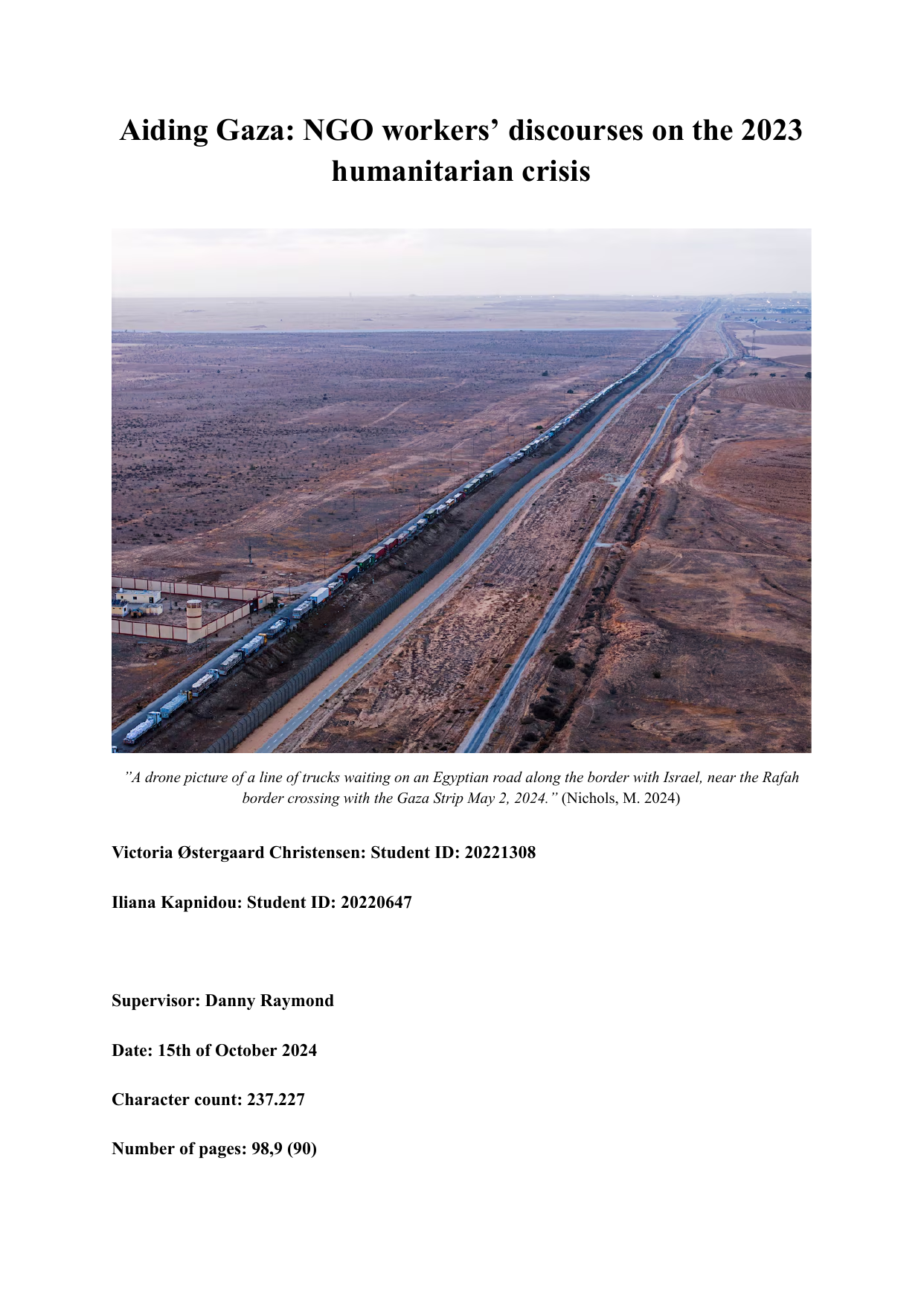
Aiding Gaza: NGO workers' discourses on the 2023 humanitarian crisis
Translated title
Aiding Gaza: NGO Workers' Discourses on the 2023 Humanitarian Crisis
Term
4. semester
Education
Publication year
2024
Submitted on
2024-10-14
Pages
115
Abstract
This thesis investigates the discursive strategies employed by NGO workers in humanitarian organizations based in Denmark and neighboring countries to Palestine, focusing on their response to the ongoing humanitarian crisis in Gaza. It focuses on the aftermath of the October 7, 2023 attack on Israel and the subsequent military response by Israel, which exacerbated an already dire humanitarian situation in Gaza. Since Hamas' takeover in 2007, Gaza has become dependent on aid due to the ensuing blockade, which was worsened by Israel’s 2023 reimposed restrictions. The current research analyzes data collected through interviews with seven NGO workers focusing on humanitarian emergency responses for Gaza. Our methodology follows Fairclough’s Critical Discourse Analysis to investigate how NGO workers' discourses are being shaped amid the challenges presented due to political interference with humanitarian aid. Our theoretical framework is a combination of seminal works on the role of humanitarian aid and its two main branches - classical humanitarianism and new humanitarianism - with most prominent theoretical inputs from Dorothea Hilhorst and Michael Barnett. The most important challenges reported pertain to increased due diligence requirements by the Danish MFA, the impediments of aid delivery and access to Gaza, as well as scrutiny of the NGOs’ Palestinian partners in Gaza, their beneficiaries, as well as public statements and advocacy. Despite a professional obligation to maintain a language grounded in the humanitarian principles, this research finds that NGO workers in this context adopt discourses of political character to challenge the political interference impacting their work. Their discourses are informed by the testimonies of their Palestinian colleagues, by drawing on comparisons with other humanitarian responses, such as the most recent one in Ukraine, incorporating terms like "double standards" and "dehumanization". As opposed to Israel’s military actions and Denmark’s political stance, articulated through opposing discourses focusing on securitization, our interviewees highlight the imperative of holding these political actors accountable for their role in the Gaza crisis. Additional findings include views on the imperative for decolonisation efforts within modern humanitarian NGOs today, wherein Palestinian voices and critiques of unequal power dynamics globally are emphasized to push for systemic change in the humanitarian response to Gaza.
This thesis investigates the discursive strategies employed by NGO workers in humanitarian organizations based in Denmark and neighboring countries to Palestine, focusing on their response to the ongoing humanitarian crisis in Gaza. It focuses on the aftermath of the October 7, 2023 attack on Israel and the subsequent military response by Israel, which exacerbated an already dire humanitarian situation in Gaza. Since Hamas' takeover in 2007, Gaza has become dependent on aid due to the ensuing blockade, which was worsened by Israel’s 2023 reimposed restrictions. The current research analyzes data collected through interviews with seven NGO workers focusing on humanitarian emergency responses for Gaza. Our methodology follows Fairclough’s Critical Discourse Analysis to investigate how NGO workers' discourses are being shaped amid the challenges presented due to political interference with humanitarian aid. Our theoretical framework is a combination of seminal works on the role of humanitarian aid and its two main branches - classical humanitarianism and new humanitarianism - with most prominent theoretical inputs from Dorothea Hilhorst and Michael Barnett. The most important challenges reported pertain to increased due diligence requirements by the Danish MFA, the impediments of aid delivery and access to Gaza, as well as scrutiny of the NGOs’ Palestinian partners in Gaza, their beneficiaries, as well as public statements and advocacy. Despite a professional obligation to maintain a language grounded in the humanitarian principles, this research finds that NGO workers in this context adopt discourses of political character to challenge the political interference impacting their work. Their discourses are informed by the testimonies of their Palestinian colleagues, by drawing on comparisons with other humanitarian responses, such as the most recent one in Ukraine, incorporating terms like "double standards" and "dehumanization". As opposed to Israel’s military actions and Denmark’s political stance, articulated through opposing discourses focusing on securitization, our interviewees highlight the imperative of holding these political actors accountable for their role in the Gaza crisis. Additional findings include views on the imperative for decolonisation efforts within modern humanitarian NGOs today, wherein Palestinian voices and critiques of unequal power dynamics globally are emphasized to push for systemic change in the humanitarian response to Gaza.
Keywords
Documents
